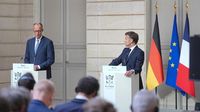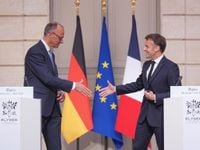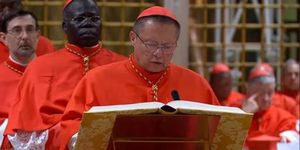On May 7, 2025, German Chancellor Friedrich Merz made his first official foreign visit to France, aiming to rejuvenate the historically significant Franco-German relationship. This visit, characterized by a renewed commitment to collaboration, sought to address the pressing challenges facing Europe today.
During a joint press conference with French President Emmanuel Macron, the two leaders announced the establishment of a Franco-German Defense and Security Council. They expressed a clear intention to "jointly respond to the challenges facing Europe" and to "act hand in hand." This initiative is seen as a crucial step in reinforcing the European Union's collective security strategy.
Merz, who took office recently, confirmed plans for a visit to Kyiv in the coming weeks, where he aims to discuss achieving a permanent ceasefire and a peace agreement with Russia. He emphasized the necessity of United States involvement in these discussions, stating that a stronger engagement from the US is essential for a resolution to the ongoing conflict in Ukraine.
"We want the Americans to stay on board," Merz remarked, highlighting the pivotal role of the US in securing peace in the region. He noted that Germany and France would offer "security guarantees" to Ukraine, contingent upon the establishment of a permanent ceasefire and a peace treaty.
Macron echoed these sentiments, stating, "We will respond together to the challenges that Europe must face," and announced regular meetings of the Franco-German Defense Council as part of this renewed cooperation. He also indicated that the next Franco-German Council of Ministers is scheduled for summer 2025, aiming to strengthen ties further.
In terms of military support for Ukraine, Macron was cautious when addressing the potential deployment of Taurus long-range missiles, suggesting that "ambiguity is the best for the Ukrainians." This response reflects a strategic approach to military aid that avoids escalating tensions while still supporting Ukraine's defense needs.
On the topic of nuclear deterrence, Merz expressed his desire to engage in discussions with France and Great Britain, emphasizing that such dialogues would supplement existing conversations with the US within NATO. He reiterated that Germany's commitment to security in Europe requires collaboration with its allies.
Despite the positive tone of the visit, differences between Merz and Macron emerged, particularly regarding trade policies. Merz advocated for the rapid ratification of the Mercosur trade agreement, stating, "The Mercosur agreement should be ratified and put into force as quickly as possible." In contrast, Macron urged for amendments to ensure that European producers are protected from lower environmental standards associated with imports from South America.
Macron's willingness to engage in a fresh start with Merz comes after a period of cooled relations under former Chancellor Olaf Scholz. The French president's optimism about Merz's leadership reflects a hope that he may prove to be a more effective counterpart than his predecessor.
Merz's decision to loosen Germany's strict budgetary rules in order to increase defense spending has been well-received in Paris, signaling a potential shift in Germany's approach to defense and military cooperation. This aspect of Merz’s policy is particularly significant given the backdrop of increased security concerns in Europe, especially in light of the ongoing war in Ukraine.
In their discussions, both leaders also touched upon global issues, including the recent conflict between India and Pakistan, and the situation in Gaza. Merz expressed deep concern regarding the Kashmir conflict, urging the rival nuclear powers to exercise restraint. He stated that Germany and France are watching the situation with "the greatest concern." Meanwhile, Macron called on Israel to lift the blockade of humanitarian aid to Gaza, describing the conditions there as "as critical as ever."
As the two leaders concluded their meeting, the establishment of the Franco-German Defense and Security Council was seen as a pivotal development, one that could reshape the dynamics of European security policy. The council is expected to meet regularly to address strategic challenges and enhance military coordination between the two nations.
In summary, Merz's inaugural visit to France marks a significant moment in Franco-German relations, characterized by a renewed commitment to security cooperation and a shared vision for addressing Europe's challenges. While differences remain, particularly in trade policy, the overarching narrative is one of collaboration and a forward-looking approach to European security.





